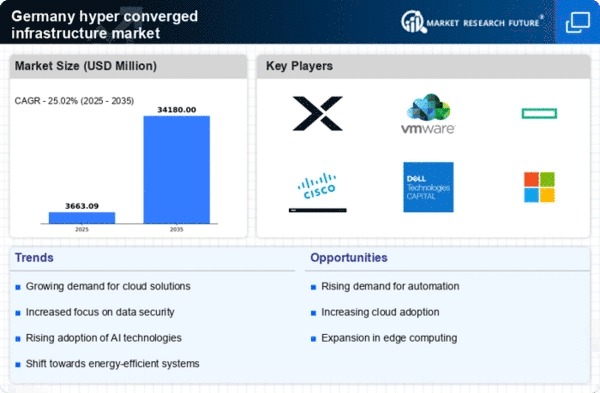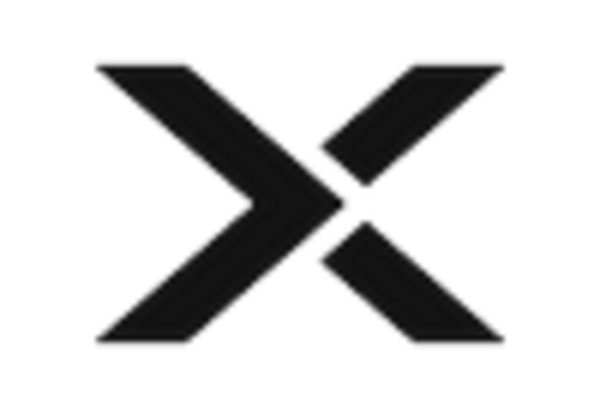Rising Demand for Scalability
The hyper converged-infrastructure market in Germany is experiencing a notable increase in demand for scalable solutions. Organizations are seeking infrastructure that can grow alongside their business needs, allowing for seamless expansion without significant upfront investments. This trend is particularly evident among medium to large enterprises, which are increasingly adopting hyper converged solutions to enhance their operational efficiency. According to recent data, the market is projected to grow at a CAGR of approximately 25% over the next five years, driven by the need for flexible and scalable IT environments. As businesses continue to prioritize agility and responsiveness, the hyper converged-infrastructure market is likely to see sustained growth, reflecting the evolving landscape of IT infrastructure in Germany.
Growing Interest in Edge Computing
The hyper converged-infrastructure market is witnessing a surge in interest related to edge computing in Germany. As organizations seek to process data closer to its source, the demand for hyper converged solutions that support edge deployments is rising. This trend is particularly relevant for industries such as manufacturing and logistics, where real-time data processing is crucial. The integration of edge computing with hyper converged infrastructure allows for improved latency and bandwidth efficiency. Analysts predict that the edge computing segment will contribute significantly to the overall growth of the hyper converged-infrastructure market, potentially accounting for a substantial share of the market by 2027.
Enhanced Disaster Recovery Capabilities
The hyper converged-infrastructure market in Germany is increasingly driven by the need for robust disaster recovery solutions. Organizations are recognizing the importance of ensuring business continuity in the face of potential disruptions. Hyper converged infrastructure offers integrated backup and recovery options, which are essential for minimizing downtime and protecting critical data. Recent studies suggest that businesses with effective disaster recovery plans can reduce recovery time by up to 50%. This capability is particularly appealing to sectors such as finance and healthcare, where data integrity is paramount. As awareness of the importance of disaster recovery grows, the hyper converged-infrastructure market is likely to see increased investment in these solutions.
Cost Efficiency and Resource Optimization
Cost efficiency remains a critical driver for the hyper converged-infrastructure market in Germany. Organizations are increasingly recognizing the financial benefits of consolidating their IT resources into a single, integrated solution. By reducing the need for multiple hardware components and streamlining management processes, businesses can achieve significant cost savings. Reports indicate that companies utilizing hyper converged solutions can reduce their total cost of ownership by up to 30%. This financial incentive is compelling for both large enterprises and SMEs, as it allows them to allocate resources more effectively and invest in innovation. As the market matures, the emphasis on cost efficiency is expected to further propel the adoption of hyper converged infrastructure.
Regulatory Compliance and Data Sovereignty
Regulatory compliance is a significant driver for the hyper converged-infrastructure market in Germany. With stringent data protection laws such as the GDPR, organizations are compelled to adopt solutions that ensure data sovereignty and compliance. Hyper converged infrastructure provides the necessary frameworks to manage data securely while adhering to regulatory requirements. Companies are increasingly investing in these solutions to mitigate risks associated with non-compliance, which can result in hefty fines. The emphasis on regulatory compliance is expected to shape the purchasing decisions of organizations, leading to a greater adoption of hyper converged infrastructure as a means to safeguard sensitive information and maintain compliance with local laws.















